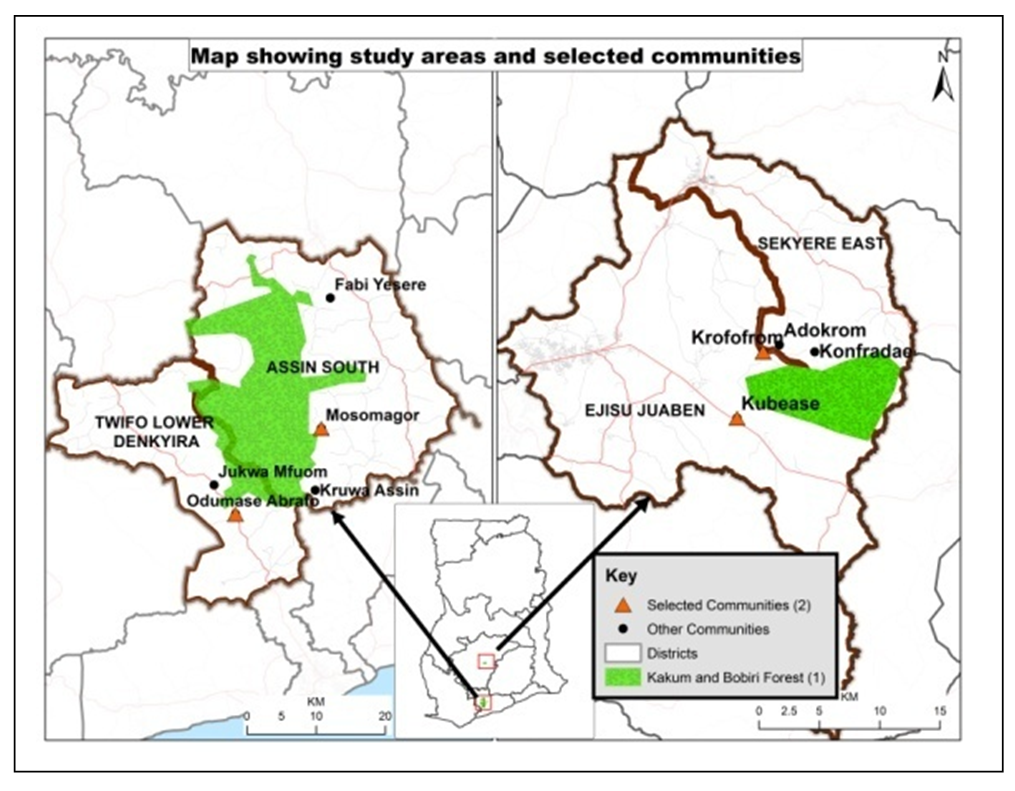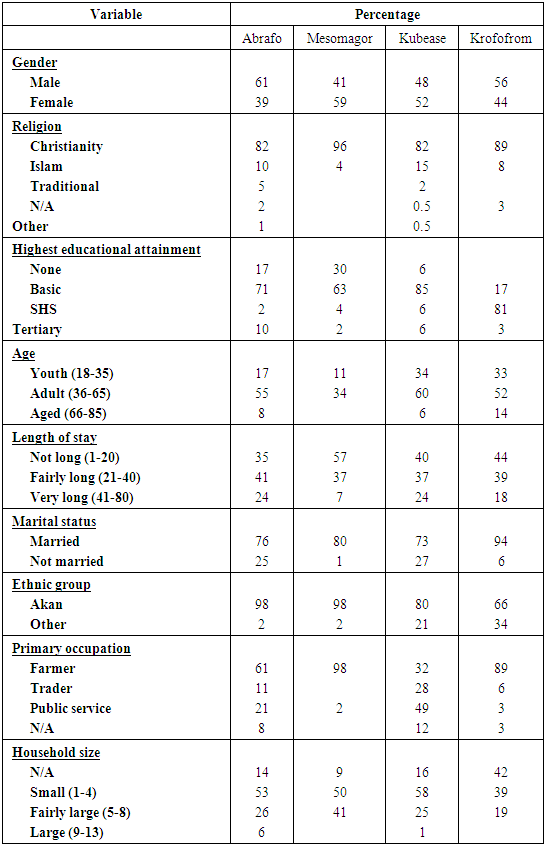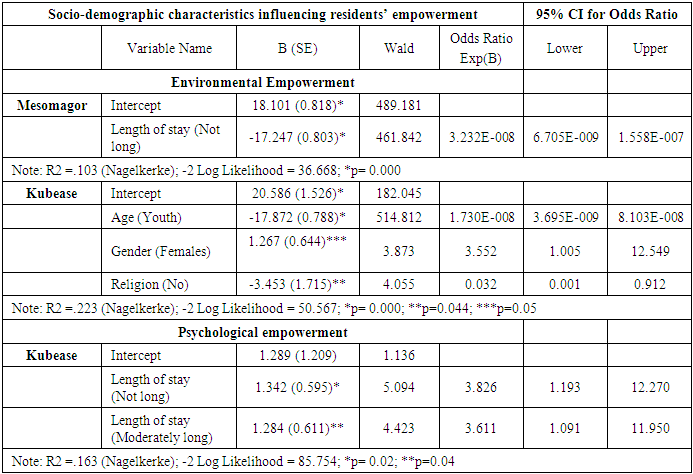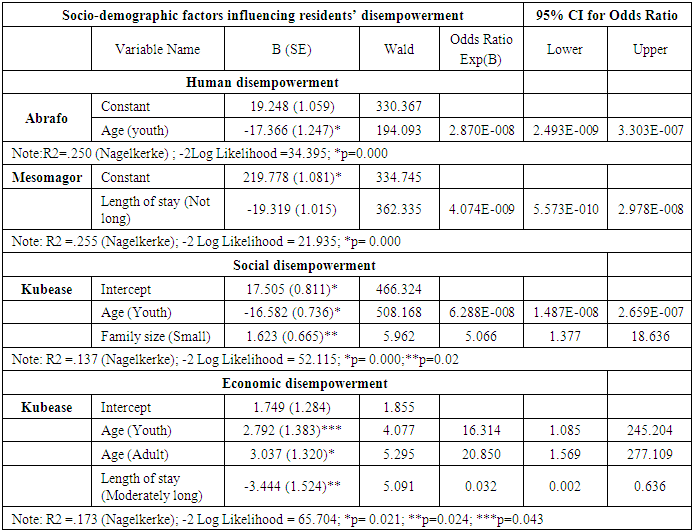-
Paper Information
- Paper Submission
-
Journal Information
- About This Journal
- Editorial Board
- Current Issue
- Archive
- Author Guidelines
- Contact Us
American Journal of Tourism Management
p-ISSN: 2326-0637 e-ISSN: 2326-0645
2021; 10(2): 25-35
doi:10.5923/j.tourism.20211002.02
Received: Sep. 12, 2021; Accepted: Oct. 13, 2021; Published: Nov. 15, 2021

Factors Influencing Residents’ Empowerment at Tourist Destinations in Ghana
Fatima Eshun
Department of Geography and Earth Science, University of Environment and Sustainable Development, PMB, Somanya
Correspondence to: Fatima Eshun, Department of Geography and Earth Science, University of Environment and Sustainable Development, PMB, Somanya.
| Email: |  |
Copyright © 2021 The Author(s). Published by Scientific & Academic Publishing.
This work is licensed under the Creative Commons Attribution International License (CC BY).
http://creativecommons.org/licenses/by/4.0/

There are increasing studies on residents' empowerment in tourism however, few authors have looked at factors influencing empowerment of residents and particularly have not linked human empowerment as a separate aspect of empowerment to the study of tourism. This study addresses this knowledge gap by examining the socio-demographic factors influencing resident’s empowerment in tourism by looking at six aspects of empowerment that is human, social, political, economic, environmental, and psychological. The study found age and length of stay influence the human disempowerment of residents and that the youth are likely to be humanly disempowered than the adult and the aged. This suggests that when conditions remain the same and there is no deliberate effort to educate and build the capacity of the youth it could have series of implications on the attainment of sustainable tourism. The study recommends that any intervention to build the human empowerment of residents at tourism destinations should consider the youth.
Keywords: Sustainable tourism, Ecotourism, Human empowerment, Environment, Sustainable development
Cite this paper: Fatima Eshun, Factors Influencing Residents’ Empowerment at Tourist Destinations in Ghana, American Journal of Tourism Management, Vol. 10 No. 2, 2021, pp. 25-35. doi: 10.5923/j.tourism.20211002.02.
Article Outline
1. Introduction
- Tourism is one of the industries that can stabilize a country’s economy. [1] assert that tourism provides economic benefits to deprived communities, preserves their environment and local cultures. Tourism contributed about $8.8 trillion to the global economy in 2018 and added about 10% of global jobs [2]. To ensure the continuity of such benefits, sustainable forms of tourism have been embraced by most nations. One form of sustainable tourism is ecotourism. TIES (2015) defines ecotourism as responsible travel to natural areas that conserves the environment, sustains the well-being of the local people, and involves interpretation and education. [4] emphasize that ecotourism is one of the critical strategies for providing socio-economic development outcomes to host communities. Most of the literature on ecotourism point out that ecotourism can provide livelihoods support to host communities. [5] assert that ecotourism can provide rural communities with socio-economic gains and conserve the environment at the same time, encourages tourists as well as residents to be environmentally conscious, abide by local regulations and put up responsible behavior to prevent damage to the natural environment [6,7]. Furthermore, ecotourism can provide rural communities with socio-economic benefits and conserve the environment at the same time [4,5,8,9].COVID -19 has brought devasting effects on most tourism sites which have implications on the benefits associated with it to host communities. [10] barometer reports indicate that there was about a 73% reduction in international tourism arrivals even though looking into the future, there is hope for the sector. With limited movements through international borders, countries need to promote the development of their domestic tourism. For decades, Ghana has depended on its domestic tourism as the main source of tourism arrivals at destinations and this has been consistent up to 2019 [11]. COVID-19 restrictions including lockdowns and restrictions to movement reduced the number of domestic tourists to destinations. To revamp the tourism sector, improving domestic tourism is critical. Most tourism destinations in Ghana are ecotourism sites and one tenet of ecotourism is to empower residents to ensure sustainable ecotourism. Some authors posit that community empowerment and the attainment of sustainable tourism should be linked [1,12]. [1] believe that when community members are highly empowered, they can contribute to the achievement of sustainable ecotourism at destinations. To help devise strategies to assist community members to be empowered, it is crucial to understand the socio-demographic characteristics that empower or disempower residents. However, few authors have looked at factors influencing the empowerment of residents [12,13]. Different aspects of empowerment have been outlined in the literature. These include social, political, psychological, environmental, and economic [14-17]. Psychological empowerment is where residents feel proud, confident, and happy about tourism in their communities. Economic empowerment is where residents enjoy economic benefits from ecotourism. Social empowerment includes connectedness, social cohesion, and provision of social infrastructure from tourism esteem and political empowerment is where residents can participate in the decision concerning tourism development [16,18-20]. Environmental empowerment is where residents can access environmental resources and protect them [17].Most authors have not linked human empowerment as a separate aspect of empowerment to the study of ecotourism and tourism in general. However, fundamental to the various aspects of empowerment is human empowerment which [21] share that human empowerment requires human services to apply different techniques such as increasing skills and self-efficacy, enhancing consciousness about the connections between individual struggles and bigger public issues, forming a coalition with others and taking steps to build personal, interpersonal or social change. [22] connects human empowerment to self-power and asserts that it is the “first face” of empowerment. It is an important personal efficacy factor that could be defined as “personal power” and that efficacy can be increased when people gain control over their destiny.[23] asserts that human empowerment denotes the provision of education, skills, and training to community members. According to [24], human empowerment is mostly about the self-empowerment of the individual to the social group. He continues that human empowerment includes providing the necessary structures for individuals to obtain an education, employment and obtain access to greater social control and use of resources. Therefore, to provide a holistic form of empowerment to residents their human capacities cannot be left behind. This study addresses this knowledge gap by examining the socio-demographic factors that influence resident’s empowerment in tourism by looking at six aspects of empowerment that is human, social, political, economic, environmental, and psychological. This can inform policy and help institutions to devise strategies to help empower residents to advance the attainment of the sustainable tourism agenda.
2. Empowerment: Definitions and Related Issues
- The idea of empowerment draws from series of theories, particularly the educational and feminist theories that advocate for bottom-up methodological approaches [25]. [26] link the idea of empowerment to the Brazilian educator Paulo Freire who believed that the educational curricula did not benefit the marginalized group since it did not address barriers to discrimination which they faced and argued for personal empowerment which is important in creating awareness on the effects of social and political discrimination. The overall objective of empowerment is to offer families, communities, and groups what they need and also liberate marginalized societies socially and politically [27]. [28] asserts that empowerment originated from the struggles of social movements which were advanced by civic and political actors seeking collective responses.The idea of community empowerment has gained much attention in many disciplines and has been researched across various disciplines [17,18]. However, its definition remains problematic [18]. It is also a procedure by which people gain authority, access to resources, and power over their lives [17]. They support the opinion that empowerment is the capability of residents to be in authority, exercise choice of their action, and have power over decisions and resources [27] believe that empowerment is a multidimensional concept and is linked to personal and social empowerment. [29] support that empowerment is granting power to employees and helping them to realize their importance. Empowerment in ecotourism is where the majority of residents benefit from various aspects of ecotourism including human, social, physical, environmental, psychological and political [30].[17] sees empowerment “as a process that helps communities to gain control over ecotourism initiatives in their area”. Furthermore, [22] views empowerment as giving power to another person or group of people or when people exert power as part of their behavior. Others believe empowerment results when people are given training [31]. It must be noted that what the various definitions share in common is that, empowerment denotes a sense of control and authority over issues that concern community members or an individual. Sustainable ecotourism requires residents to improve their livelihoods and this can be achieved when residents participate in the tourism development process [32,33]. However, participating at the highest level when people have a sense of control and benefit from all aspects of the tourism process is crucial for pursuing the sustainable tourism agenda.
2.1. Factors Influencing Residents’ Empowerment
- Communities’ empowerment could be influenced by series of factors. A study conducted in Bangladesh on factors affecting women empowerment uncovered that the educational status and age of respondents were significant in their status of empowerment [34]. Other authors investigated the factors influencing employees empowerment in Zimbabwe and found that factors contributing to their disempowerment include organizational culture, availability of resources, managers' leadership styles, and quality of training among others [35]. In addition, a study conducted by [36], revealed that prior knowledge contributed to students’ empowerment. Other studies found that education does not affect residents' opportunities to work within the tourism sector [12].[37] asserts that some of the factors affecting community participation include community interest and support from institutions. Furthermore, [38] established that the age of respondents does not influence their perception of empowerment but established that gender, position, and tenure do have a strong influence on empowerment. Their research also revealed that the education, gender, tenure, and job position of respondents related significantly to empowerment. Again, [29] conducted a study on factors affecting employees' attitude to empowerment and found that the age of respondents related significantly to their perception of empowerment whilst gender and nationality were not significant. They added that respondents with higher levels of education-related positively to empowerment.Moreover, [39] investigated the factors affecting Korean nursing student empowerment in clinical practice and established that their empowerment would be increased with education. They continue that when they are treated as valued learners their self-esteem would be enhanced. In addition, [40] assert that some of the factors influencing community-based sustainability include a sense of belongingness. Not all but also [41] investigated socio-demographic characteristics and community participation in tourism at Mesomagor and found that gender and income were related to community participation. Again, [42] researched tourism involvement and perceived benefits in Tanzania and found sex, age, and education to be significantly related to participation in tourism. Other authors found that psychological empowerment influences place identity and place dependence of residents [13]. As destinations try to pursue sustainable development goals, it is important to understand the factors that could contribute to or hinder resident’s empowerment process to inform policy.
3. Study Areas and Methods
3.1. Study Areas
- This was conducted at KNP and BFRBS in Ghana. KNP was gazetted as a National Park and Resource Reserve by the Wildlife Reserves Regulation (LI 1525) in 1992 to protect the watersheds of the Kakum River, other rivers around the communities surrounding the Park [4], and reduce biodiversity loss [43]. KNP is the most visited ecotourism destination in Ghana [44]. The rich biodiversity resources provided by KNP offer opportunities for ecotourism development. Ecotourism was developed in KNP in 1995 to assist with the development of the communities and the construction of a 333m canopy walkway in the western part of the Park by Conservation International and the Government of Ghana (GoG) greatly enhanced visitation to the park [4,45]. The BFRBS falls within the Ejisu Juaben Municipality and was created in 1939 when it was an unexploited primary forest [5]. The size of the reserve is about 54.6 sq. Km and is about 35 km South-east of Kumasi, the Ashanti Regional capital. It has about 340 butterfly species and 120 birds which are the main attractions to the sanctuary.Two communities around each destination were selected for the study. From KNP Mesomagor and Abrafo were selected. Abrafo is a gateway to the forest and it is located along a major road. Mesomagor is at the remote side of the tourism destination with no regular transportation to the area. It used to have a tree platform as a community-based tourism attraction but this has collapsed. The economic activities undertaken by residents are farming and they depend on this for survival. At BFRBS Kubease and Krofofrom were selected. Kubease is a gateway to the forest and is along a major road with a toll where some of the residents sell food items to passengers who stop to engage in tourism or other activities. The major economic activity is farming. Krofofrom is at the remote side of the attraction without regular transport and most community members engage in farming as their primary economic activity. These study sites are important because they helped to understand the various background characteristics of residents at the major tourism road and those that are at the remote side of the attraction. Furthermore, [2,5] assert that residents' participation in decision-making regarding forest management at BFRBS is low. [4,43] observed that the economic goals of residents at KNP were not met. The map for the study areas is shown in figure 1.
 | Figure 1. Map of study areas |
3.2. Methodology
- The study employed quantitative approaches to investigate the phenomenon. Questionnaires were used to sample a cross-section of the population. The population of the communities that were selected based on the 2010 population census [46] is Kubease 1,798, Krofofrom has 316, Mesomagor 406, and Abrafo 833. Proportional sampling was applied to select a percentage of respondents for the survey. Ten percent (10%) was applied to select the sample size from each of the communities. Kubease was (180), Krofofrom was (32), Abrafo (83) and Mesomagor (41). An extra 10% was calculated on the sample size to cover those who the researcher is not able to reach [47]. The total sample size was 373, thus Kubease 199, Mesomagor 45, Abrafo 93, and Krofofrom 36.To satisfy this objective, multinomial regressions were performed because the data consists of a nominal dependent variable and eight independent variables. According to McDonald (2014), multinomial regression is employed when there are nominal dependent variables and many independent variables. The respondents were asked to indicate what best describes them. For instance, in the case of human empowerment, they were asked to select whether they have had any alternative training, know ecotourism or have not had any training on alternative livelihoods, or have no knowledge about ecotourism. These were recoded into dummy variables for human empowerment and disempowerment. The same was done for the other types of empowerment. These were used as the dependent variables thus (economic, social, environmental, political, psychological, and human empowerment) and the independent variables (age, years of stay, education, occupation, gender, marital status, family size, and religion) to run the multinomial regression. This was performed to ascertain the effects of two or more independent variables on the dependent variable [49]. The regression test is essential since it helped the researcher to know which factors influence community empowerment and to predict the effects of independent variables on the dependent variables [49,50]. Simple logistic regression was used to analyze the research hypotheses.
4. Results
4.1. Profile of Respondents
- The characteristics of respondents are displayed in Table 1. The table portrays the sex, length of stay of respondents, primary occupation, age, religious affiliation, highest educational qualification, ethnicity, and marital status. The characteristics of respondents are important since it assists the researcher to know the background of those whose views are captured in the study.
|
4.2. Socio-demographic Characteristics Influencing Residents’ Empowerment
- The background characteristics of respondents were used as predictors to assess which of them influence the empowerment of community members. The factors that influence the empowerment of residents are shown in Table 2.
|
4.3. Socio-demographic Factors Influencing Residents’ Disempowerment
- Several socio-demographic factors influence residents’ disempowerment. These are shown in Table 3.
|
5. Discussions
5.1. Socio-demographic Factors Influencing Residents’ Empowerment and Disempowerment
- The extent of residents’ empowerment is influenced by series of factors that range from institutional, leadership skills, and demographic conditions (38). The study found various socio-demographic factors influencing residents’ empowerment. At KNP, the factor affecting environmental empowerment is the length of stay which happens to be significant for those who have not lived at Mesomagor for a longer period. On the other hand, age, sex, and religion influence the environmental empowerment of residents at Kubease. Those who are environmentally empowered abide by environmental rules and regulations governing the practices of ecotourism. Those who have not lived long at these destinations engage in environmental practices to preserve the forest than those who have lived there for a long time. This is important for stakeholders interested in promoting the environmental empowerment of residents to target those who have lived there for a long time. Besides, the age, sex, and religion of residents are important factors to also consider when promoting the environmental empowerment of residents. It further provides support to other studies that age and sex are significant in residents' participation in tourism [51,52].The factor influencing the psychological empowerment of residents at Kubease is the length of stay. This was statistically significant for those who have stayed there for moderately long (21-40 years) and those who have not stayed there for a long time (1-20 years). Other authors found that psychological empowerment influences place dependence and identity helping residents to place value on their places of residents [13]. However, this study reveals that although residents at psychologically empowered and that they are happy and confident about their places of residents and such feelings are important for ecotourism sustainability, this is true for those who have lived at the location for moderately long and not long. This has implications for sustainable tourism development as those who have lived there for a long time may not feel proud of living at the tourism destination. This could be attributed to the lack of economic benefits to residents as earlier studies have pointed out that the economic objectives of these destinations are not met [4,32]. When people live in their communities where they feel something special occurs, they are likely to become happy and proud about their communities.The study findings that age influences the human disempowerment of residents in Abrafo is consistent with research from Pakistan where the age of women influenced their disempowerment [53]. Earlier studies pointed out that, residents are humanly empowered when they have the knowledge, they have their skills developed, and have been trained in alternative livelihoods [21-24,54]. Knowledge application is essential in the attainment of all other forms of empowerment and requires critical attention. When residents have the requisite knowledge about ecotourism activities, skills to improve their capacities, they can enhance their livelihoods and help progress the sustainable tourism agenda. When these are absent and the majority of residents lack education, skills, and knowledge then they are humanly disempowered [24,55-58]. The age at which people acquire knowledge is crucial for building their human capacities to be humanly empowered. Training the youth, providing them with knowledge about tourism, and building their capacities earlier in their lives can help them apply this knowledge and skills earlier in their lives and benefit from these capacities.Length of stay influences the human disempowerment of residents in Mesomagor. It is a migrant community and the majority of respondents have not lived there for long (1-20 years). There used to be a Community-Based Ecotourism Project (CBEP) which has ceased operation because residents did not know about operating ecotourism activity. This provides support to the literature that residents are disempowered when they have little or no knowledge about ecotourism [24,55-58]. Residents at Mesomagor have inadequate knowledge of the management of CBEP and since the beginning of this project, few people have had the chance to be trained. The project collapsed since those who have settled there within this period has little or no knowledge about CBEP. Therefore, future programs to revive the project and provide human empowerment to residents should consider those in this category.The age of respondents in Kubease influences their social disempowerment. It has been established in the literature that social disempowerment occurs when the majority of residents do not feel connected to their community and have not received infrastructure from ecotourism [17,18,20,59,60]. This study reveals that those who are socially disempowered in Kubease are the youth. In the case of Kubease, ecotourism started around 1996, so 2021 is 25 years. That is if a person was even 10 years at the beginning of ecotourism, that person will be 35 years in 2021 and it is not surprising that the youth (18-35) have not experienced more of ecotourism to feel that it connects them to their community. This is not just by chance but is statistically significant in the case of Kubease with the youth groups. Such groups have not witnessed the provision of social infrastructure from ecotourism as well which has implications for ecotourism sustainability. Therefore, programs to build social empowerment of residents should be targeted at the youth.Moreover, age and length of stay influence the economic disempowerment of residents at Kubease. Earlier studies have emphasized that economic disempowerment occurs when there is leakage, economic gains are not spread equitably and the work of residents is not related to ecotourism [17], [20], [60], [61]. This study reveals that the economic disempowerment of residents is not just by chance but statistically significant among the youth, the adult, and those who have stayed moderately long in Kubease. It is the youth and the adult that form the working population hence interventions to economically empower residents should consider these groups. Furthermore, those who have stayed there moderately long are economically disempowered and if conditions remain permanent, their continuous stay at Kubease would increase their economic disempowerment status. Therefore, economic empowerment programs should also consider those in this category.
6. Conclusions and Recommendations
- The study found age influences residents' human disempowerment and that it is important to provide knowledge, skills, and training to residents at an age that would be beneficial to their livelihoods. Again, length of stay was found to influence the human disempowerment of residents. Those who tend to stay longer at destinations where there are no conscious efforts to provide education, skills, and training programs to residents make them humanly disempowered. Furthermore, age and length of stay influence the economic disempowerment of residents. Ecotourism objectives require the provision of economic benefits and where residents stay longer at destinations where their economic objectives are not met as this study reveals, they become economically disempowered. The study recommends that policy interventions to build the human and economic empowerment of residents should take into consideration their age and length of stay. Furthermore, strategies should be put in place to provide human and economic empowerment to residents particularly the youth to enable them to enjoy prolonged benefits from ecotourism.
ACKNOWLEDGMENTS
- To all field assistants and community members who participated in this study.
 Abstract
Abstract Reference
Reference Full-Text PDF
Full-Text PDF Full-text HTML
Full-text HTML

